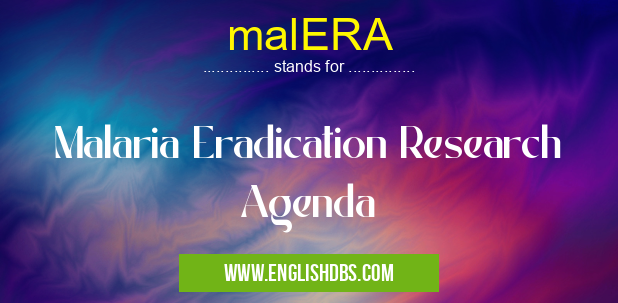What does MALERA mean in DISEASES
malERA is a collaborative effort of researchers, policymakers, and other stakeholders working towards the goal of malaria eradication. It was launched in 2007 by the Malaria Eradication Scientific Alliance (MESA), a consortium of leading malaria research institutions.

malERA meaning in Diseases in Medical
malERA mostly used in an acronym Diseases in Category Medical that means Malaria Eradication Research Agenda
Shorthand: malERA,
Full Form: Malaria Eradication Research Agenda
For more information of "Malaria Eradication Research Agenda", see the section below.
What is malERA?
Focus of malERA
malERA focuses on identifying and prioritizing research gaps that need to be addressed to achieve malaria eradication. The initiative involves:
- Conducting systematic reviews of existing literature
- Identifying areas where further research is needed
- Developing research proposals and funding opportunities
- Facilitating collaboration among researchers
Key Research Areas
malERA's research agenda covers a wide range of topics, including:
- Vaccines: Developing effective and affordable malaria vaccines
- Diagnostics: Improving diagnostic tools to detect malaria infections
- Drugs: Discovering and developing new antimalarial drugs
- Vector Control: Developing innovative methods to control mosquito populations
- Surveillance: Strengthening surveillance systems to monitor malaria transmission
- Social and Behavioral Research: Understanding the social and behavioral factors that influence malaria transmission
Essential Questions and Answers on Malaria Eradication Research Agenda in "MEDICAL»DISEASES"
What is malERA?
malERA stands for Malaria Eradication Research Agenda. It is a global research initiative that aims to develop and implement the tools and strategies needed to eradicate malaria.
Why is malaria eradication important?
Malaria is a deadly disease that kills hundreds of thousands of people each year, mostly children under the age of 5. Eradicating malaria would save millions of lives and improve the health and well-being of billions of people.
What are the challenges to malaria eradication?
There are a number of challenges to malaria eradication, including the development of drug and insecticide resistance, the lack of an effective vaccine, and the difficulty of reaching remote areas where malaria is prevalent.
What is malERA doing to address these challenges?
malERA is bringing together researchers from around the world to develop new tools and strategies to overcome the challenges to malaria eradication. These include new drugs, vaccines, insecticides, and diagnostic tools.
How can I get involved in malERA?
There are a number of ways to get involved in malERA. You can donate to the malERA fund, volunteer your time to help with research, or advocate for policies that support malaria eradication.
Final Words: malERA plays a crucial role in coordinating and directing research efforts towards the eradication of malaria. By identifying research gaps and prioritizing key areas of investigation, malERA helps to ensure that research efforts are focused on the most pressing needs. The success of malERA's initiative will contribute significantly to the global goal of eradicating malaria.
malERA also stands for: |
|
| All stands for malERA |
